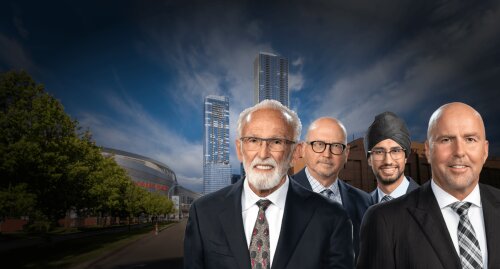Best Dangerous Product Lawyers in Canada
Share your needs with us, get contacted by law firms.
Free. Takes 2 min.
Or refine your search by selecting a city:
List of the best lawyers in Canada
About Dangerous Product Law in Canada
In Canada, dangerous product laws are governed primarily by the Canada Consumer Product Safety Act (CCPSA), assuring that consumer products in the country are safe for use. These laws pertain to the design, manufacturing, labeling, and distribution of products to ensure they meet health and safety standards. The regulations aim to prevent injuries or harm caused by hazardous products and hold companies accountable for any violations. Stakeholders, including manufacturers, importers, and retailers, are obligated to comply with these standards to enhance consumer protection.
Why You May Need a Lawyer
People may require legal assistance regarding dangerous products in various situations, such as:
- Injury or harm caused by a defective or dangerous product.
- Disputes over product liability and responsibility for defective products.
- Need for compensation or coverage for medical expenses and other damages.
- Product recalls and the legal implications associated with compliance failures.
- Negotiating settlements or engaging in litigation for defective products.
In these cases, an experienced lawyer can navigate the complexities of the law to protect your rights and ensure appropriate restitution is sought.
Local Laws Overview
Several key aspects of local laws in Canada are pertinent to dangerous products:
- The Canada Consumer Product Safety Act (CCPSA): Regulates the safety and accountability of consumer products, prohibiting the manufacture, importation, and sale of unsafe items.
- Product recalls: The CCPSA mandates that companies report dangerous products and undertake recalls if they pose health or safety hazards.
- Labeling requirements: Companies must provide clear, adequate labels with safety warnings and usage instructions to prevent consumer harm.
- Manufacturers' and distributors' responsibilities: All stakeholders in the supply chain are required to ensure compliance with safety standards and maintain records.
- Enforcement and penalties: Non-compliance with dangerous product laws can result in severe legal penalties, including fines and legal actions.
Frequently Asked Questions
What constitutes a "dangerous product" under Canadian law?
A dangerous product is one that poses a risk to the health or safety of the public due to its design, construction, or usage, or due to the lack of appropriate warnings or instructions.
How do I report a dangerous product?
Reports can be made to Health Canada's Consumer Product Safety Program, where consumers and stakeholders can notify unsafe products.
What is the process for a product recall?
Upon identifying a hazardous product, companies must report to Health Canada, which may then trigger a recall. Companies are responsible for informing the public and removing the product from distribution.
Can I sue a manufacturer for a defective product?
Yes, if you have suffered damages due to a defective product, you may pursue a legal claim for compensation against the manufacturer, distributor, or seller.
What is the statute of limitations for product liability claims in Canada?
The statute of limitations varies by province, but generally, a claim must be filed within two years from when the harm was, or should have been, discovered.
How can I determine if my product is covered by the CCPSA?
Most consumer products fall under the CCPSA. However, some items like food, drugs, and cosmetics may be governed by separate safety regulations.
What penalties can a company face for non-compliance with product safety laws?
Companies may be subject to fines, court orders, or even criminal charges for failing to comply with safety standards.
What are my rights as a consumer regarding dangerous products?
Consumers have the right to safe products, transparent labeling, and the ability to report hazardous goods. They can also seek legal recourse for any injuries incurred.
Can imported products be subject to different regulations?
No, the CCPSA applies uniformly to all consumer products in Canada, whether locally produced or imported.
Who oversees the enforcement of product safety regulations?
Health Canada is the main regulatory body responsible for enforcing consumer product safety regulations in the country.
Additional Resources
For more information or assistance regarding dangerous products, consider contacting:
- Health Canada's Consumer Product Safety Program
- The Competition Bureau (for deceptive marketing practices)
- Provincial and territorial consumer affairs offices
- Local legal aid offices or consumer advocacy groups
Next Steps
If you believe you have a legal issue related to a dangerous product, take the following steps:
- Document everything: Keep records of your purchase, any injuries sustained, and communications regarding the product.
- Contact a lawyer: Seek legal counsel with expertise in product liability to evaluate your situation and advise you on the best course of action.
- Report the issue: Notify Health Canada of any dangerous products to prompt regulatory investigation and potential recall.
- Stay informed: Educate yourself on your rights and the regulations concerning dangerous products to protect yourself and your family.
By understanding your rights and the legal avenues available, you can adeptly manage situations involving dangerous products.
Lawzana helps you find the best lawyers and law firms in Canada through a curated and pre-screened list of qualified legal professionals. Our platform offers rankings and detailed profiles of attorneys and law firms, allowing you to compare based on practice areas, including Dangerous Product, experience, and client feedback.
Each profile includes a description of the firm's areas of practice, client reviews, team members and partners, year of establishment, spoken languages, office locations, contact information, social media presence, and any published articles or resources. Most firms on our platform speak English and are experienced in both local and international legal matters.
Get a quote from top-rated law firms in Canada — quickly, securely, and without unnecessary hassle.
Disclaimer:
The information provided on this page is for general informational purposes only and does not constitute legal advice. While we strive to ensure the accuracy and relevance of the content, legal information may change over time, and interpretations of the law can vary. You should always consult with a qualified legal professional for advice specific to your situation.
We disclaim all liability for actions taken or not taken based on the content of this page. If you believe any information is incorrect or outdated, please contact us, and we will review and update it where appropriate.
Browse dangerous product law firms by city in Canada
Refine your search by selecting a city.















